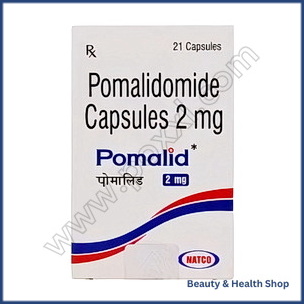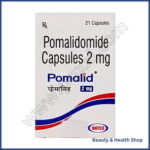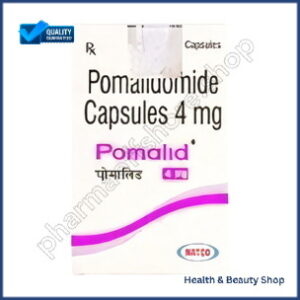ADDICTION
ALCOHOL DEPENDENCE
QUIT SMOKING
ALLERGY
ANTI FUNGAL
FUNGAL INFECTION
FUNGAL NAIL INFECTIONS
ANTI-REJECTION DRUGS
ANTI WORM
ANTIBIOTIC
BACTERIAL INFECTIONS
ARTHRITIS
GOUT
OSTEOARTHRITIS
RHEUMATOID ARTHRITIS
BLOOD
LOW PLATELET COUNT
THROMBOPHLEBITIS
VARICOSE VEINS
COLON
ANAL FISSURE
PILES
ULCERATIVE COLITIS
DIABETES CARE
DIABETES INSIPIDUS
DIABETES TYPE
DIABETIC FOOT ULCERS
GLUCOSE MONITOR
EYES/EAR CARE
DRY EYES
EYE CARE
EYE EXAMINATION
EYE INFECTION
EYE LASHES
EYE PAIN
GLAUCOMA
OCULAR HYPERTENSION
UVEITIS
FEVER CARE
MALARIA
RHEUMATIC FEVER
TYPHOID FEVER
GASTROINTESTINAL
ACIDITY
CONSTIPATION
CROHN'S DISEASE
DIARRHOEA
GALLBLADDER STONES
INTESTINAL ULCERS
IRRITABLE BOWEL SYNDROME
MOTION SICKNESS
NAUSEA
Pomalid 2 mg (Pomalidomide)
| Active Ingredient (Generic Name): | Pomalidomide |
|---|---|
| Indication: | Multiple myeloma |
| Manufacturer: | Natco Pharma Ltd. |
| Packaging: | 21 capsules in one strip |
| Strength: | 2 mg |
From: $310.00
Pomalid 2 mg, or Pomalidomide, is used to treat certain cancers like multiple myeloma. It belongs to immunomodulatory agents that slow cancer cell growth and enhance the immune system. This medication is effective when other treatments fail and improves symptoms such as bone pain and anemia. Take it once daily with water, consistently and fully, to see benefits. Important precautions are needed for drug interactions and dosage adjustments. Check for symptoms like fatigue, shortness of breath, and infections. Storage, disposal, and authentic sourcing are essential for safety. Brand names include Pomalyst, Imnovid, and Pomalex. For more detailed information on Pomalid 2 mg‘s effectiveness and usage, continue with the details provided.
Starting your journey with pomalidomide means understanding its uses and potential side effects. Pomalidomide, sold under the brand name Pomalid 2 mg, is a medication primarily used to treat certain types of cancer, such as multiple myeloma. It belongs to a class of drugs known as immunomodulatory agents, which work by helping the immune system slow down or stop the growth of cancer cells.
Before taking pomalidomide, it’s essential to be aware of the potential side effects. Common side effects may include fatigue, nausea, diarrhea, constipation, and low blood cell counts. It’s important to monitor your blood cell levels regularly while on this medication to prevent any complications.
Additionally, pomalidomide can be harmful to an unborn baby, so it’s crucial to use effective contraception while taking this medication and for a period after stopping treatment. It’s important to discuss any concerns or questions about pomalidomide with your healthcare provider to guarantee safe and effective treatment.
Efficacy of Pomalid 2 mg
To assess the effectiveness of Pomalid 2 mg in treating certain types of cancer, such as multiple myeloma, it’s important to understand its impact on cancer cell growth and patient outcomes.
Pomalidomide, the active ingredient in Pomalid 2 mg, works by inhibiting the growth of cancer cells and enhancing the immune system’s response to cancer. Clinical studies have shown that Pomalid 2 mg can help in slowing down the progression of multiple myeloma, especially in patients who haven’t responded well to other treatments.
Patients taking Pomalid 2 mg may experience improvements in symptoms such as bone pain, anemia, and fatigue.
Why is this medication prescribed?
Pomalid 2 mg is typically prescribed by healthcare providers to patients with certain types of cancer, such as multiple myeloma, to inhibit cancer cell growth and improve patient outcomes.
Multiple myeloma is a type of cancer that affects plasma cells in the bone marrow. Pomalidomide, the active ingredient in Pomalid 2 mg, works by aiding the immune system attack and destroy cancer cells.
This medication is often used when other treatments haven’t been effective or when the cancer has returned after treatment. By targeting specific pathways involved in cancer cell growth, Pomalid 2 mg can slow down the progression of the disease and help manage symptoms.
It’s important to follow your healthcare provider‘s instructions carefully when taking this medication to guarantee the best possible outcomes. Discuss any questions or concerns you may have with your healthcare provider to optimize the benefits of Pomalid 2 mg in your cancer treatment plan.
How should this medicine be used?
When using this medication, make sure to carefully follow the dosage instructions provided by your healthcare provider. Pomalidomide is usually taken once daily with water, with or without food. Swallow the capsules whole, without breaking, chewing, or crushing them.
It’s important to take the medication at the same time each day to maintain consistent levels in your body. If you miss a dose, take it as soon as you remember, unless it’s close to the time for your next dose. In that case, skip the missed dose and continue with your regular dosing schedule. Don’t take a double dose to make up for a missed one.
Your healthcare provider may adjust your dosage based on your response to treatment and any side effects experienced. It’s crucial to communicate any concerns or changes in your condition to your healthcare provider promptly.
Other uses for this medicine
If prescribed by your healthcare provider, Pomalidomide may be used for conditions beyond its primary approved use. While Pomalidomide is primarily indicated for the treatment of multiple myeloma, a type of cancer affecting plasma cells, it has shown promise in treating other conditions. Some studies suggest that Pomalidomide may be beneficial in certain autoimmune diseases, such as systemic lupus erythematosus and rheumatoid arthritis. Additionally, research indicates that Pomalidomide may have anti-inflammatory properties that could be useful in conditions like inflammatory bowel disease.
It is essential to note that using Pomalidomide for off-label purposes should only be done under the guidance and supervision of a qualified healthcare professional. Off-label use refers to the practice of prescribing a medication for a condition or in a dosage different from what’s approved by regulatory agencies. Your doctor will consider the potential benefits and risks before recommending Pomalidomide for an off-label use, ensuring that you receive safe and effective treatment tailored to your specific medical needs.
What special precautions should I follow?
When taking pomalidomide, it’s important to check for any potential drug interactions. This medication may interact with other substances, affecting its effectiveness or causing harmful side effects.
Always consult with your healthcare provider or pharmacist before starting any new medications to guarantee your safety and well-being.
Check for Drug Interactions
Before combining Pomalidomide with any other medications, make sure to thoroughly check for potential drug interactions to prevent adverse effects.
Here are three essential steps to keep in mind:
-
Consult with your healthcare provider: Always seek guidance from your doctor or pharmacist before starting Pomalidomide to discuss any existing medications or supplements you’re taking.
-
Provide a detailed medication list: Make sure to provide a complete list of all prescription drugs, over-the-counter medications, vitamins, and herbal supplements to help identify possible interactions.
-
Monitor for side effects: Be vigilant for any unusual symptoms or changes in health after starting Pomalidomide, and promptly report them to your healthcare provider for further evaluation.
What special dietary instructions should I follow?
Follow a low-sodium diet while taking Pomalidomide to help manage potential side effects. Limiting your sodium intake can assist in reducing fluid retention and swelling, which are common side effects of this medication.
Be cautious with processed foods, canned soups, and salty snacks, as they’re typically high in sodium. Opt for fresh fruits and vegetables, lean proteins, and whole grains instead. Remember to read food labels carefully and choose low-sodium or sodium-free options whenever possible.
Additionally, staying hydrated by drinking an adequate amount of water can help flush out excess sodium from your body. It’s essential to consult with your healthcare provider or a dietitian to create a personalized low-sodium meal plan that suits your dietary preferences and restrictions.
What should I do if I forget a dose?
If you overlook a dose of Pomalidomide, promptly take it when you remember, unless it’s nearly time for your next scheduled dose.
If you realize you missed a dose close to the time for your next one, it’s best to skip the missed dose and continue with your regular dosing schedule. Don’t double the dose to compensate for the missed one as this can increase the risk of side effects.
It’s crucial to try and take your medication consistently to guarantee the best possible outcomes. Setting reminders or integrating it into your daily routine can help minimize the chances of forgetting a dose. If you have difficulty remembering, consider using a pillbox or setting alarms on your phone.
If you frequently miss doses, it might be beneficial to discuss this with your healthcare provider to explore strategies that can help you in adhering to your treatment plan effectively.
What side effects can this medication cause?
When taking Pomalidomide, it’s important to be aware of the potential side effects. Some side effects can be severe, so it’s vital to monitor for any persistent symptoms.
If you experience any concerning symptoms, make sure to contact your doctor promptly for further guidance.
Monitor for Persistent Symptoms
Be vigilant for any persistent symptoms that may arise as potential side effects of taking Pomalidomide. Some side effects may require monitoring and medical attention to guarantee your well-being.
Here are three key symptoms to watch for:
-
Fatigue: Feeling unusually tired or weak over an extended period could indicate a side effect that needs attention.
-
Shortness of Breath: If you experience difficulty breathing that persists, it’s essential to consult your healthcare provider promptly.
-
Unexplained Bruising or Bleeding: Any signs of bruising or bleeding without a known cause should be monitored closely and reported to your doctor.
Monitoring these symptoms can help in detecting and managing any potential side effects of Pomalidomide promptly.
Some side effects can be serious. If you experience any of the following symptoms, call your doctor immediately:
To guarantee your well-being while taking Pomalidomide, it’s important to be conscious of potential serious side effects that may necessitate immediate medical attention. If you experience any of the following symptoms, contact your doctor promptly:
-
Severe Skin Reactions: Look out for skin rashes, blistering, or peeling, as these could indicate a serious allergic reaction.
-
Difficulty Breathing: If you have sudden shortness of breath, chest pain, or wheezing, seek medical help immediately.
-
Signs of Infection: Pay attention to symptoms like fever, chills, persistent sore throat, or unusual fatigue, as these could signal a serious infection that needs prompt treatment.
Being aware of these potential side effects and acting swiftly can help ensure your safety while using Pomalidomide.
What should I know about the storage and disposal of this medication?
Properly storing and disposing of pomalidomide is vital for maintaining its effectiveness and preventing harm to others. Store your medication at room temperature away from moisture and heat. Keep it in the original container with the lid tightly closed. Make sure to keep pomalidomide out of reach of children and pets. Don’t use the medication if the seal on the bottle is broken or missing.
When it comes to disposing of pomalidomide, don’t throw it in the trash or flush it down the toilet. Instead, follow specific guidelines for medication disposal. You can check with your healthcare provider or pharmacist for information on take-back programs or community disposal options available in your area. It’s essential to dispose of medications properly to prevent accidental ingestion by children, pets, or individuals for whom the medication wasn’t prescribed.
In case of an emergency/overdose
In the event of an emergency or overdose involving pomalidomide, it’s important to seek immediate medical assistance by contacting emergency services or a poison control center. If you suspect an overdose or encounter severe side effects such as difficulty breathing, unconsciousness, or irregular heartbeats after taking pomalidomide, don’t hesitate to call for help. It’s essential to provide information about the medication ingested, the dosage, and the time of ingestion to the medical professionals to guarantee appropriate treatment.
Do not attempt to treat the overdose yourself or induce vomiting unless instructed to do so by medical personnel. Stay with the individual experiencing the overdose and monitor their vital signs if possible until help arrives. Remember that prompt medical attention is crucial in cases of overdose to prevent further complications and ensure the best possible outcome.
Always keep emergency contacts readily available and be prepared to provide accurate information to assist healthcare providers in delivering the necessary care in a timely manner.
What other information should I know?
Make sure you understand the potential drug interactions and side effects associated with pomalidomide before starting this medication. Pomalidomide may interact with other medications, including blood thinners, which can increase the risk of bleeding. Inform your healthcare provider about all the medications you’re currently taking to avoid any harmful interactions.
Additionally, pomalidomide can lower your immune system‘s ability to fight infections, so it’s essential to stay vigilant for any signs of infection while on this medication. Common side effects of pomalidomide include fatigue, nausea, diarrhea, and low blood cell counts. Contact your doctor if these side effects persist or worsen.
It’s also important to use effective contraception while taking pomalidomide, as it can cause harm to an unborn baby. Your doctor will guide you on the appropriate contraceptive methods to use during treatment. Remember to attend all scheduled doctor appointments to monitor your progress and address any concerns promptly.
Brand names
Understanding the brand names under which pomalidomide is marketed can help you identify this medication when prescribed by your healthcare provider. Pomalidomide is primarily known by its brand name, ‘Pomalyst,’ but it is also marketed under other names in different regions. Below is a table listing some of the brand names of pomalidomide used globally:
| Brand Name | Region | Manufacturer |
|---|---|---|
| Pomalyst | United States | Celgene |
| Imnovid | European Union | Celgene |
| Pomalex | India | Natco Pharma |
When discussing pomalidomide with your healthcare provider or pharmacist, having knowledge of these various brand names is crucial to receiving the correct medication. Whether you see it labeled as Pomalyst, Imnovid, or Pomalex, rest assured that they all contain the active ingredient pomalidomide and serve the same purpose in treating certain conditions.
Purchase From Authorized Pharmacies
When purchasing pomalidomide, make sure to buy it only from authorized pharmacies to guarantee its authenticity and quality. Authorized pharmacies have met specific standards set by regulatory bodies to ensure that the medication you receive is genuine and safe for use. By buying from authorized pharmacies, you reduce the risk of encountering counterfeit or substandard products that may be harmful to your health.
These pharmacies source their medications directly from reputable manufacturers, ensuring proper storage and handling to maintain the drug’s effectiveness. Additionally, buying from authorized pharmacies allows you access to professional advice from pharmacists who can guide you on the correct usage, potential side effects, and interactions with other medications.
To summarise
To summarize, make sure you purchase pomalidomide only from authorized pharmacies for your safety and treatment efficacy. Obtaining medication from legitimate sources ensures that you receive the correct product that has been stored and handled appropriately, reducing the risk of counterfeit or substandard drugs. Authorized pharmacies adhere to strict regulations and quality standards, guaranteeing the authenticity and effectiveness of the medication you’re purchasing. By acquiring pomalidomide from reputable pharmacies, you can trust that you’re receiving the genuine product that meets the necessary safety and quality requirements.
Additionally, buying from authorized pharmacies provides you with the opportunity to consult pharmacists or healthcare professionals who can offer guidance on the proper usage, potential side effects, and interactions with other medications. They can also assist in monitoring your treatment progress and adjusting doses if needed. Making sure that you obtain pomalidomide from authorized sources is essential in safeguarding your health and achieving the best outcomes from your treatment.





There are no reviews yet.